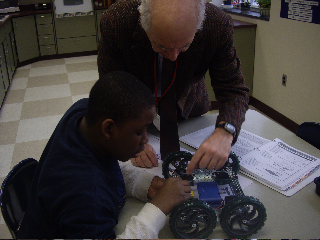
Once a week, students in Scott Middle School’s afterschool technology program get a chance to tinker. One of the mentors in this Coatesville, Pennsylvania, program is Dr. John Hall, who also happens to be the school psychologist. Students in the program take on a variety of projects, but robot building looms large, and in fact John describes himself not only as a psychologist but also as a roboteer mentor.
SMILE: Tell us about the Scott Middle School Success Program (the afterschool technology program). We’re also fascinated by your dual role of psychologist and tech mentor—do you see any overlap in your two roles at the school?
John Hall: Once a week, two groups of about 10 students each work on hands-on activities that expand on what they have learned during the day in their academic classes. As a mentor in the afterschool program I work with a co-mentor, Angela Hunter, who is a tech administrator at the Chester County Intermediate Unit. We use a holistic approach, concentrating not only on academic enrichment but also on other factors that influence learning.
I take our middle school students through several team- and skill-building activities to the point where they can work as teams to build a VEX robot. As a roboteer mentor in the afterschool classrooms, I help to create a sense of continuity between the regular school day and the afterschool site. Additionally, I provide extended social support as school psychologist. Since it's a small group, about 10 students at a time, I can focus on the learning differences between each student and shape the robotics curriculum to meet their unique needs.
SMILE: How do you integrate howtosmile.org into your program and projects?

John Hall: I became excited about howtosmile.org when I found a wealth of fun activities that I could use to introduce team building, communication, and cooperation to the afterschool group. I like howtosmile.org’s community of sharing.
I also like being able to pre-select and categorize relevant and interesting mini-projects from a variety of activities in the howtosmile.org catalog. The activities have great potential to help provide fun hands-on bridge activities between where the students are and more complex challenging activities like robotics or computational science.
For example, I use howtosmile.org activities during our preliminary team building phase to help teach behavior expectations, build self-efficacy, and enhance positive motivation prior to the start of the sometimes frustrating robotics building phase.
Prior to each team building session I go the Scott Middle School page on the howtosmile.org website for activities that meet the needs of my students, check to make sure I have the necessary supplies, and print out the instruction sheets. During the activity sessions I like to show the videos on a Smartboard so the students immediately know what they can achieve. A favorite is the Magnus Glider; that was a big success!
Related links:
National Robotics Week: April 9 – 17, 2011
VEX Robotics World Championship: April 14 – 16, 2011; “Three Days of Fierce Back-to-Back Robotics Challenges” at the ESPN Wide World of Sports Complex at Walt Disney World Resort in Kissimmee, Florida.
The VEX web site says that “the VEX Robotics Competition is the largest and fastest growing middle and high school robotics program globally with more than 2,500 teams from 20 countries playing in more than 200 tournaments worldwide.”
Photo 1: Dr. Hall’s co-roboteer mentor, Angela Hunter, with students at Scott Middle School
Photo 2: Roboteer mentor Dr. John Hall with a Scott Middle School student
